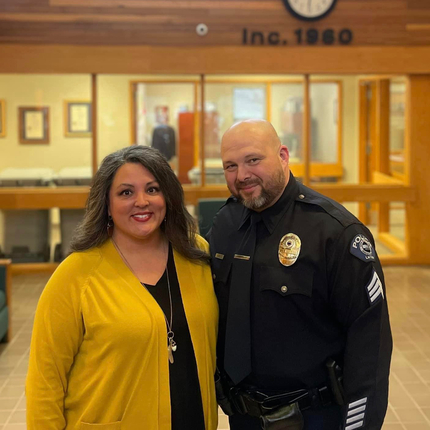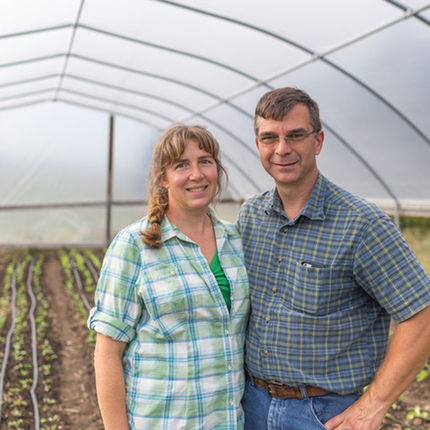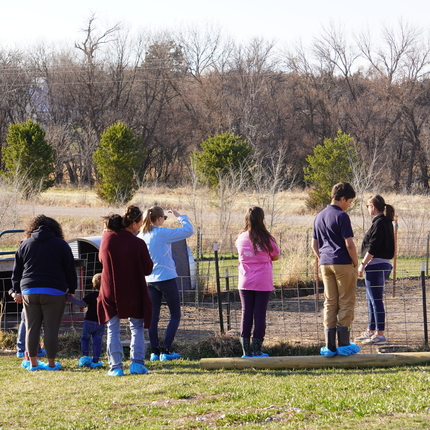Emely Hendl contributed to this story.
For the past three years, military veterans and active service members, along with their families, have had the opportunity to explore agriculture through a series of workshops designed to navigate a year in the life of a local farmer who is also a veteran.
Hosted by the Center for Rural Affairs, the workshops have covered the topics of horticulture, pork production, and poultry production. The classes rotated between online classroom sessions and on-farm sessions with an online option.
Participants were able to hear from experts and learn business and financial skills, as well as discover resources applicable to all types of agricultural operations. Those in attendance also learned from experienced farmers as they demonstrated knowledge of different enterprises on their farms.
Farmers of all skill levels found the workshops to be helpful. Three attendees shared their thoughts on the workshops: Yolanda and Mark Hardesty, from Glenwood, Iowa, who are both active in the U.S. Armed Services—Yolanda in the Army National Guard and Mark in the Marine Corps; retired U.S. Naval Commander Jerry Cornett, who traveled from Gretna, Nebraska; and Leif Protze, a U.S. Army veteran who joined the discussions online.
From beginner to advanced, farming is for everyone
Initially, a love of food got Jerry interested in farming, and his military background helped him become successful in agriculture, as he describes himself as “just below advanced” in skill level.
“My wife and I both enjoy food and exploring the culture of food,” he said. “We were especially intrigued by a concept we experienced in Italy—a meal at a restaurant derived from the farm and the local area. I was a Naval helicopter pilot, and the military gave me the confidence to start something new, not be afraid, and to make mistakes. Organization, attention to detail, mission focus, and establishing priorities are crossover habits that helped me in my agricultural duties.”
Jerry was a farmer leader in year one and served as an advisor of the workshops in years two and three. He and his wife owned Prairie Plate Restaurant and Lakehouse Farm in Waverly, Nebraska. Before they sold the business because of the pandemic and health issues, they applied much of what they learned from the workshops to their restaurant and farm.
Leif, who considers himself an intermediate level farmer, also enjoyed attending the first two years of the “Year in the Life” workshops. Because the Center offered the classes online, he and many others were able to join from afar.
“I’m thankful for nonprofits like the Center providing such an amazing free service to military members so they can further themselves in a new career opportunity,” Leif said.
Yolanda and her husband, Mark, are no strangers to serving the community through the military, church, and school. They continue to show that support through their ever-growing farm, Ashton Acres, in Glenwood, Iowa, where they raise rabbits, bees, and chickens, and tend a small vegetable garden.
“These workshops caught my eye because they’re directly geared toward veterans,” Yolanda said. “I may be just in the beginning stages of farming, just gathering information and growing with my mistakes, but I have learned so much already.”
Workshops designed with veterans in mind
The Center not only hosts workshops for veterans, the organization also has veteran farmers leading, hosting, and guiding the classes.
“The hosts share their experiences on the topics we cover throughout the classes,” said Kirstin Bailey, senior project associate with the Center. “The content they provide sometimes has military lingo, their military experience may be referenced, or it’s as simple as a meme that references and acknowledges their shared experience, a meme that not everyone would understand or appreciate.”
At times, conversation during these workshops steers toward veteran specific topics like VA benefits and how they can be used in general or with farming in mind.
“We share resources from other organizations that are just for veterans, and invite organizations with veteran programs to come to our classes and share,” Kirstin said. “We are starting to see a peer-to-peer network form from our classes and we are looking forward to continuing this programming and seeing the network grow.”
Veterans gain valuable takeaways
Yolanda heard about the Center’s workshops through another veteran farming family, and started attending “A Year in the Life'' online and in-person during its second year.
“The relationships I made during these workshops have been so helpful,” she said. “Learning how others do things and actually seeing the practice first hand has been invaluable.”
She’s been able to share some of the knowledge she’s gained with other farmers, including information about a round-rotational grazing system that she hopes to use in her own space. Yolanda also discovered a great deal about the different characteristics of pigs.
“I found it very interesting that pigs really do love pigsties, and meat from an animal that isn’t castrated is tainted,” she said. “I also found out that different breeds of pigs behave differently: KuneKunes don’t root like other pigs which leave less holes around the property.”
Jerry feels the workshops have been beneficial for him as well.
“There is always something new to learn in farming, whether it’s simpler processes or easier planting techniques, I’m always gleaning little bits of wisdom,” he said.
One of the greatest lessons he’s learned over years of attending workshops is for farmers to ask themselves, “What is your time worth to you?”
“You need to give it a dollar figure (per hour),” Jerry said. ”There will be lots of things on the farm you can do and a few you want to do—how much do they cost you in time? And is it worth it from a profitability perspective?”
Early on in his farming venture, Jerry established his hourly wage for this planning exercise as $20 per hour.
“If I crunched the numbers at $20 per hour to offer a new fruit or vegetable or new value-added product, like pickled vegetables, and it didn’t ‘pay’ me at least $20 per hour, I didn’t do it, even if I loved it, my customers loved it, etc,” he said. “In my old age, I think that number should have been higher.”
Leif, like several others, heard about the workshop online, and had attended several other free classes hosted by the Center. He has enjoyed sharing his experiences with other veterans and used the numerous resources the Center has provided.
“I learned so much from the farmer hosts and others in attendance online,” he said. “I feel I have a good foundational set of ideas and where to begin in the future.”
Future farming plans
Each farmer has their own path to follow and is pursuing agriculture at a pace that works for their lifestyle.
Yolanda is still learning about agriculture, and she hopes to use the knowledge she’s gained from the workshops to build up their family farm.
“So many great things have come from getting my hands dirty and teaching my family things for their future,” she said. “The ‘Year in the Life’ workshops gave me the motivation and encouragement to seek out alternate ideas for building local business on our farm.”
Leif has plans to locate his farm in Oregon, New York, or another farm-friendly state. He hopes to raise buffalo for meat purposes. Recently, due to health concerns, he had to hold off on that venture.
“I’m putting my plans temporarily on hold,” he said. “I’m determined to attend future activities to help with my farm dreams.”
And, although Jerry and his wife sold their farm in 2021, they stay connected to agriculture. The couple grows a very large garden and edible landscape on 1 acre of land near Gretna.
For more information about the Center’s events, including “A Year in the Life of a Poultry Producer,” visit cfra.org/events.
Feature photos: Top: Yolanda and Mark Hardesty. Middle: Renee and Jerry Cornett. Bottom: The group taking a tour at Anchor Meadow Farm, near Milford, Nebraska, owned by Matt and Emely Hendl.
Programming is funded through the National Institute of Food and Agriculture (NIFA), through the U.S. Department of Agriculture. NIFA USDA fund Award #2020-77028-32890.







